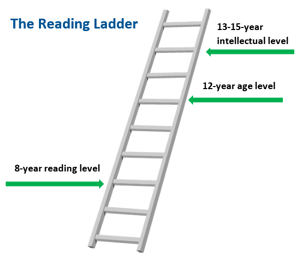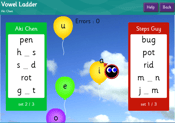My child hates reading – what should I do?
Ros Lugg, Nov 26, 2020 8:06:39 AM
This question comes up surprisingly often. Concerned parents, who are worried about their child’s reading, are keen to do the right thing at home, but it can be difficult to identify the most effective approach. It’s not easy for parents to put themselves into the position where they’re actively ‘teaching’ their child. Some manage fantastically, but for some, it just doesn’t work – even when they’re qualified teachers! It’s just not the right kind of relationship in some cases.
Also, by definition, struggling readers struggle to read! I know that sounds very obvious, but think about what that actually means from the child’s point of view.
I have to do all of this reading at school, which I find really difficult and tiring. Then I have to do the same thing at home. I’m beginning to hate books!
 Bear in mind that, if a reader is reading at the limit of their current ability, they’re heavily reliant on decoding. Decoding is difficult and stressful – and more importantly, it stops you following the sense of what you’re reading. So, for a child in this position, there’s no intrinsic reward for this activity. There’s no enjoyment of a shared book or story. Books have become just a chore.
Bear in mind that, if a reader is reading at the limit of their current ability, they’re heavily reliant on decoding. Decoding is difficult and stressful – and more importantly, it stops you following the sense of what you’re reading. So, for a child in this position, there’s no intrinsic reward for this activity. There’s no enjoyment of a shared book or story. Books have become just a chore.
The other big issue is one of level. We’re going to explain our concept of the ‘Reading Ladder’ to illustrate this one:

This illustration explains the situation for a 12-year-old who is struggling with reading. Imagine they are currently reading at an 8-year-old level.
This level of discrepancy (between reading age and actual age) is not that unusual in schools!
Imagine this learner tackling one of his reading books – designed for an 8-year reading age. These are the factors which will affect him:
- He has to rely heavily on conscious decoding because he’s reading at the limit of his current reading level. This means that he’s not able to follow the subject easily. It’s also hard work – and not much fun!
- He’s going through a very stressful process. Imagine having to ‘parade’ your errors one after another in front of someone who you know can read with no difficulty at all.
- Even if he were able to follow the sense effectively, he wouldn’t be interested in the passage. He’s 12 years of age and this was written for an 8 year-old. Actually, if he’s a bright 12-year-old, he should actually be accessing text at a much higher level – probably at the 13-15 year level – even more of a discrepancy.
In reality, this is a totally negative process for this learner. So why do we do it?
Well, many schools/teachers work on the premise that a struggling reader needs more reading. In fact, this is rarely the answer.
Some fascinating American research shows that about 60% of learners progress with literacy regardless of method. With these learners, it really doesn’t matter what method is used – they are the ones who do learn to read through reading.
However, around 40% need a more structured method and some of them – particularly the dyslexics – will need considerably more structure. Actually, these learners learn to read more effectively through a spelling-based approach – providing it’s done in the right way.
So how do we use this knowledge to support our children at home? Well, this is what we’d recommend:
Your main aim is to get your child to love books!
Bear in mind that there are two aspects to reading
|
The mechanical process of reading. In other words, either: Decoding Word recognition |
and...
|
What we’d describe as the ‘intellectual’ aspects: Sense/meaning Vocabulary and comprehension Enjoyment of the content |
Comprehension, vocabulary, enjoyment of the content all come from exposure to the more formal language of books. It doesn’t mean that you have to read all the words yourself. You can get those aspects by listening to a story or book.
Main resources:
- You! Go to the library together, choose anything he’s interested in and read to him. No pressure to follow the text exactly or help with the reading process at all. Just concentrate on enjoying the book together.
- Audio books. These are a fabulous resource. Every library will have a selection of audiobooks designed for all ages and all interests. Have a talk to your librarian and explain what your child is particularly interested in and they can help you find the right books.
So, are we saying it’s not important to practise reading books?
No, we’re not. We need to work on both aspects – the mechanical aspects and the intellectual ones.
However, with learners in this category, they are likely to progress through a more spelling-based approach, providing that it’s done in the right way, with all words seen and used in context and the right activities to develop all the skills needed for reading.
The biggest dangers are:
- Your child is totally turned off books and avoids reading like the plague!
- Your child is only exposed to the level of ideas and vocabulary which he can read for himself. Disastrous for his comprehension and vocabulary (as well as his enjoyment of reading).
This blog is too short to go into the right way of teaching spelling, but our other materials cover this. However, in the meantime, these are our recommendations for parents:
- Discuss your child’s reading with their teacher. Maybe show them this blog and ask them for their opinion or advice. Decide together what reading will be set for homework. A little bit of ‘reading for practice’ is fine, but keep it to a minimum and make it as unstressful as possible. When you’re doing this kind of reading, don’t make the child battle to decode for himself. Show them by saying the sounds of the word as you point to each letter or letter pattern.
- Read books/stories to your child, or use audiobooks. As much as possible! Encourage your child to explore and enjoy new genres or topics – by listening and discussing ideas.
- Replace the ‘reading for the skill’ aspects by enjoyable spelling-based activities. A programme such as StepsWeb can provide the right approach for struggling readers, but in a varied, enjoyable way.

Remember: If you’re teaching spelling in the right way, you’re teaching all of the skills and knowledge needed for reading. With the right resources, you’re also developing the area of the brain needed for instant visual recognition of words – which is vital for reading fluency.
Sign up for a free 14-day trial of StepsWeb to access a range of resources and activities to support your child's reading, spelling, and language skills.



.png?width=800&name=download%20(1).png)